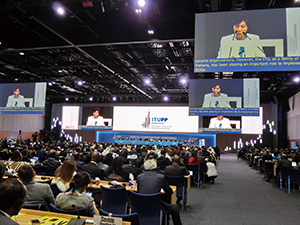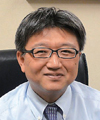 |
|||
|
|
|||
|
Global Standardization Activities Vol. 17, No. 4, pp. 28–30, Apr. 2019. https://doi.org/10.53829/ntr201904gls Results of the International Telecommunication Union (ITU) Plenipotentiary Conference 2018AbstractThe International Telecommunication Union (ITU) Plenipotentiary Conference was held from October 29 to November 16, 2018. This article introduces the results of the elections of senior officials and the member states of the Council of the ITU, and discussions of the main agenda items. Keywords: ITU, ITU Plenipotentiary Conference, ITU Charter 1. Overview of the conferenceThe International Telecommunication Union (ITU) Plenipotentiary Conference was held at Dubai World Trade Centre, Dubai, United Arab Emirates, from October 29 to November 16, 2018. It was attended by over 2500 delegates from 182 states, including ministers in charge of telecommunications (Photo 1). Held every four years, this conference is the top decision-making body of the ITU with the participation of representatives from all ITU member states. From Japan, 39 delegates from both the government and the private sector took part in it, the delegation being headed by State Minister Yukari Sato and Vice-Minister for Policy Coordination Katsuya Watanabe, both from the Ministry of Internal Affairs and Communications.
2. Results of the elections of senior officials and member states to serve on the CouncilThe elections for the Secretary-General and Deputy Secretary-General were held on November 1. Houlin Zhao of China was re-elected Secretary-General with 176 votes out of 178 votes cast. Malcom Johnson of the United Kingdom was re-elected Deputy Secretary-General with 113 votes out of 178 votes cast. Mr. Brahima Sanou of Burkina Faso, current Director of the Telecommunication Development Bureau (ITU-D), received 65 votes. The elections for Director of the Radiocommunication Bureau (ITU-R), Director of the Telecommunication Standardization Bureau (ITU-T), and Director of ITU-D were held on November 2. Mario Maniewicz of Uruguay was elected as the new Director of the Radiocommunication Bureau with 108 votes out of 176 votes cast in the second round of the election, while István Bozsóki of Hungary received 64 votes. Chaesub Lee of the Republic of Korea was re-elected Director of the Telecommunication Standardization Bureau with 174 votes out of 179 votes cast. Doreen Bogdan-Martin of the United States was elected as the new Director of the Telecommunication Development Bureau with 95 votes out of 179 votes cast in the first round of the election, in which the required majority was 89. She is the first female director in the ITU. The elections for the members of the Radio Regulations Board and the member states of the Council were held on November 5. Akira Hashimoto, NTT DOCOMO Counsellor for Standardization, received 169 votes, which was the highest among all the candidates, and was elected as a member in the Asia and Australasia Region. Japan was elected a Council member state by receiving 166 votes, the second highest in the Asia and Australasia Region. Japan has now been elected a member state 12 times consecutively. 3. Results of discussions of items on the main agendaDiscussions were held day in and day out, including on the weekend days. The discussions on the day before the final day continued up to 5:30 am the following day. The main results of the discussions are as follows. (1) ITU Charter and Treaties The Asia and Australasia Region and the Africa Region submitted a proposal that the ITU Charter and treaties not be revised unless absolutely necessary. The proposal was adopted without modification. (2) Strategies and financial plan for 2020–2023 The Council submitted a plan that describes ITU activity policies for the four years starting in 2020. The Middle East and African Regions proposed to add the words, “online privacy,” but this proposal was not accepted. Based on the strategies described in the plan, the activities that ITU needs to tackle in an effort to achieve the Sustainable Development Goals will be reorganized, and financial allocations and the activities of each sector will be defined. (3) Internet-related issues The Middle East Region submitted a proposal that the Digital Object Numbering Authority (DONA) Foundation* be referred to alongside the Internet Corporation for Assigned Names and Numbers (ICANN) and other Internet-related organizations and also submitted a proposal that was intended to transfer the role of ICANN to the ITU. From the viewpoint of ensuring technical neutrality and the clarification of the roles of different organizations, Japan, the US, and the European Region opposed the reference to DONA and were thus in conflict with the positions of the Middle East and African Regions. After a prolonged discussion, a modified resolution was adopted that made no reference to DONA and retained the current scope of ITU’s role but gave due attention to the concerns of developing countries. (4) Security-related issue There was a conflict between two groups. The Middle East and African Regions want to actively promote the formation of international rules such as new treaties for ensuring cybersecurity, while Japan, the US, and the European Region want to respect the sovereignty of individual states and see the ITU’s role as focusing on raising awareness about security and building security capabilities. (5) International Telecommunication Regulations (ITRs) The Middle East and Russian Regions made a proposal to revise the ITRs in 2020. The European Region submitted a proposal that seeks to terminate the review of ITRs, while the African Region, China, and the US proposed to continue the review of ITRs. There was a dispute over whether it is necessary to revise ITRs and whether future review results are to be considered a prerequisite for revision of the ITRs. In the end, the issue of revising ITRs was not resolved, and a modified resolution was adopted to continue reviewing ITRs. (6) Formulation of a new resolution about artificial intelligence (AI) The Middle East Region proposed the creation of a new resolution about AI, while the European Region and the US proposed a resolution based on a neutral position. There was a dispute over whether to explicitly state that the scope, policy, and regulations of AI are outside the scope of the ITU, with a result that no resolution was created. (7) Formulation of a new resolution about Over the Top (OTT) The African, Middle East, European, and Russian Regions, and the US and Brazil proposed the creation of a new resolution about OTT services. The Middle East and Russian Regions proposed to study OTT for formulating regulations or international public policies, but Japan, the European Region, the US, and some other countries opposed the proposal. In the end, the relevant text was deleted, and a new resolution that emphasized continuation of the study within the scope of the ITU and coordination with related organizations and stakeholders was adopted.
|
|||










